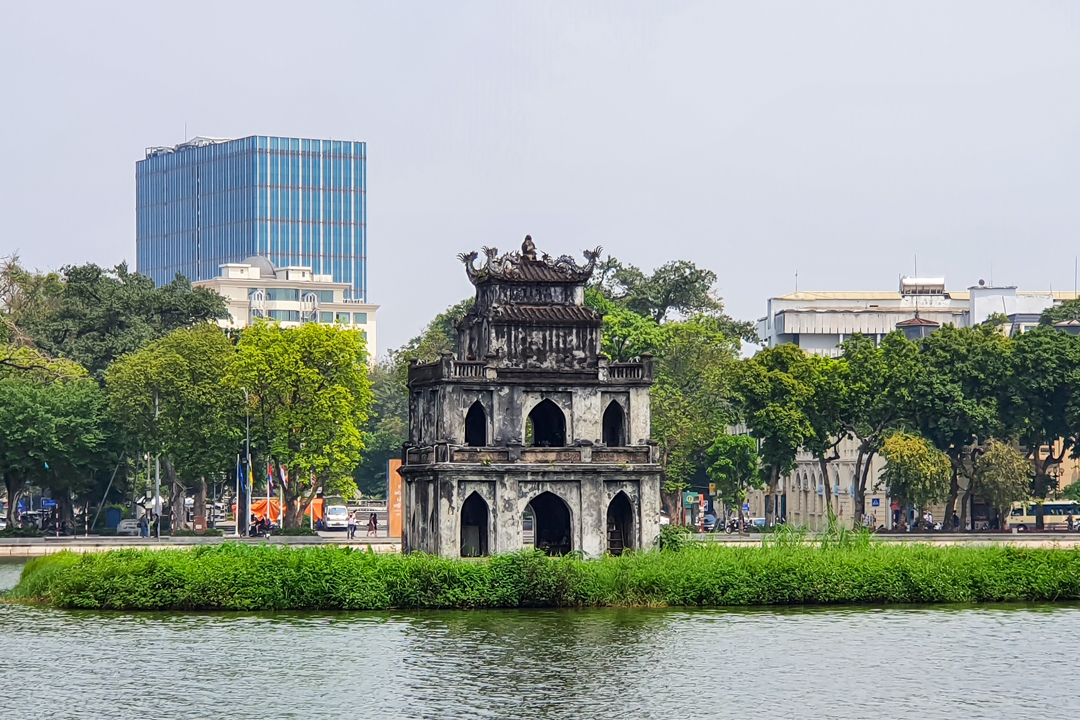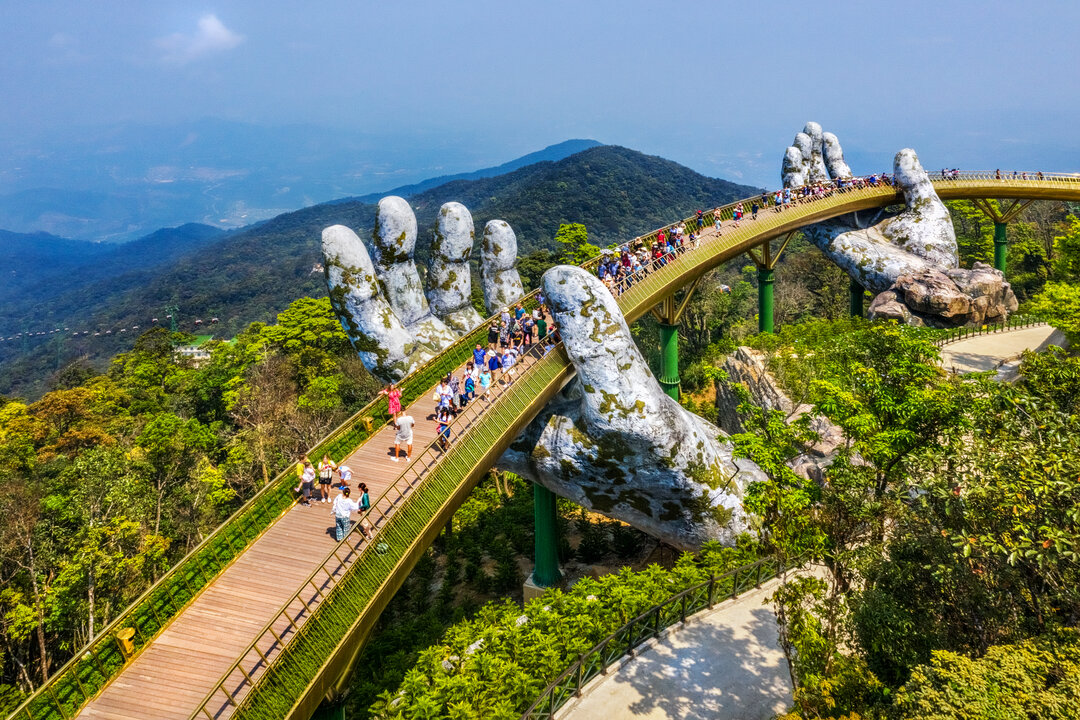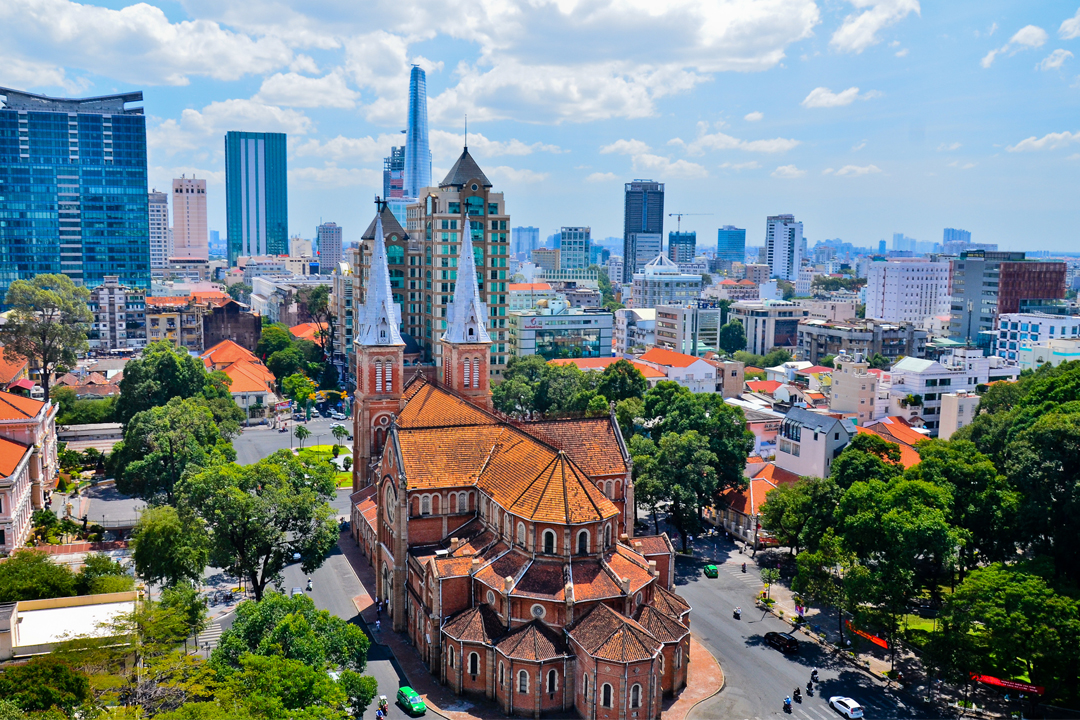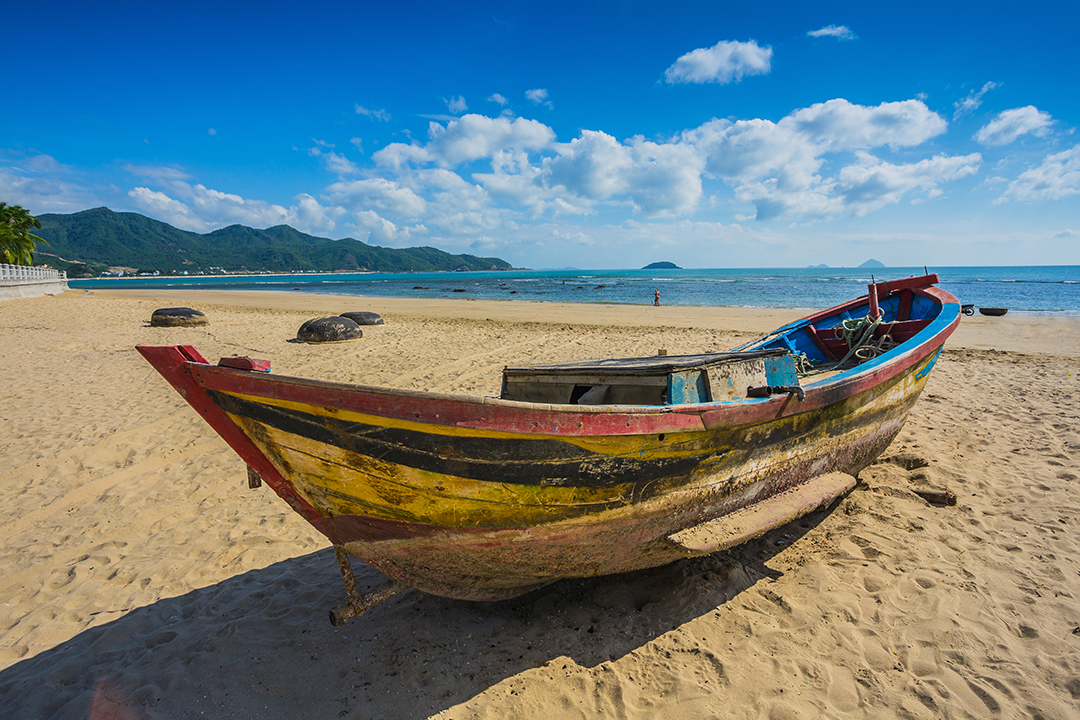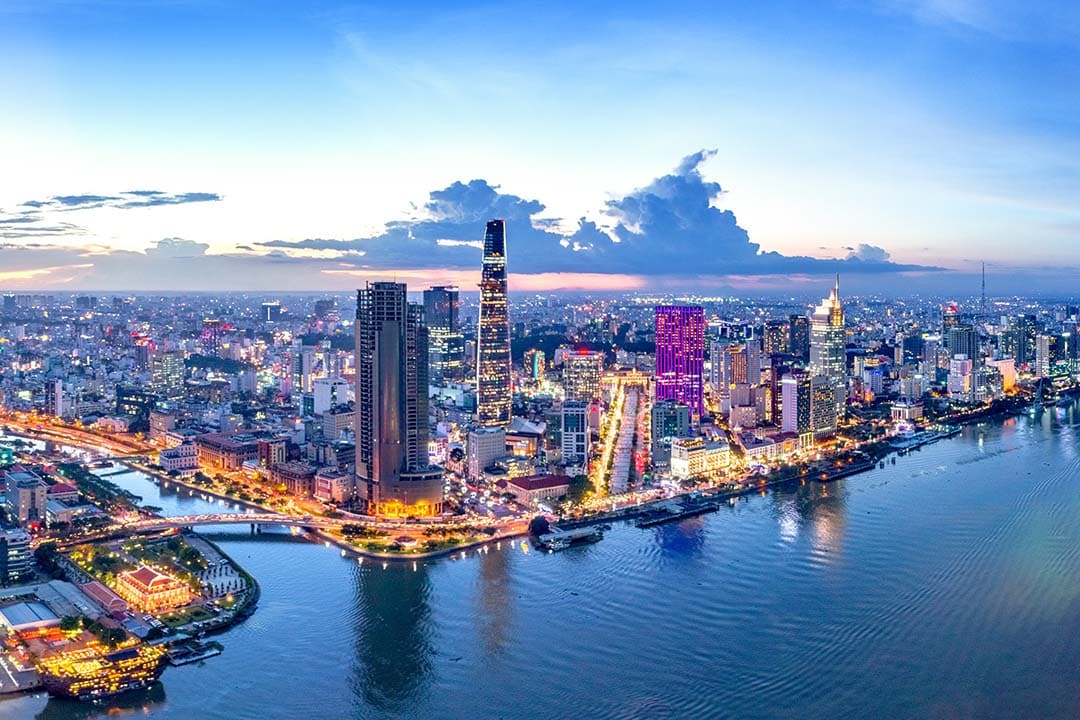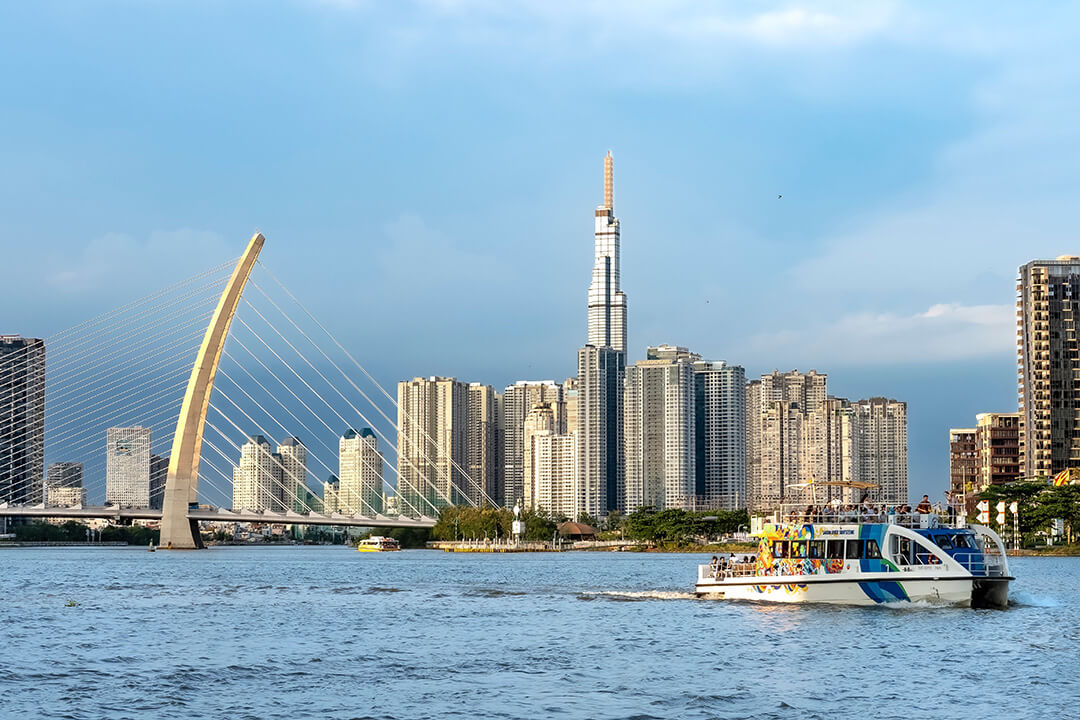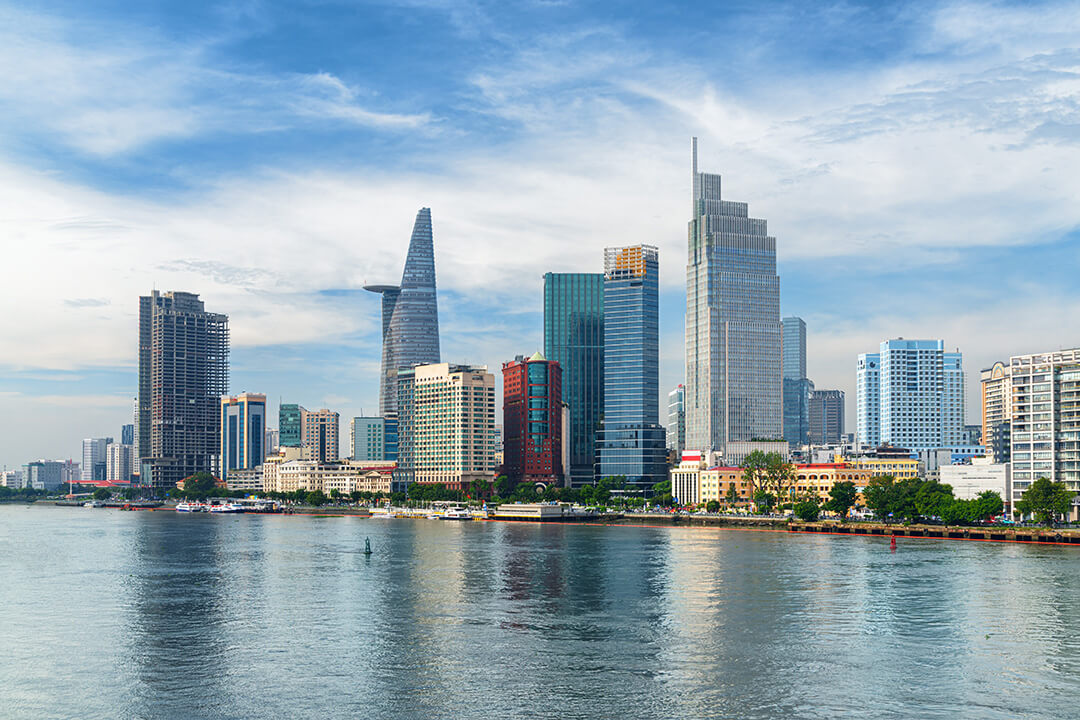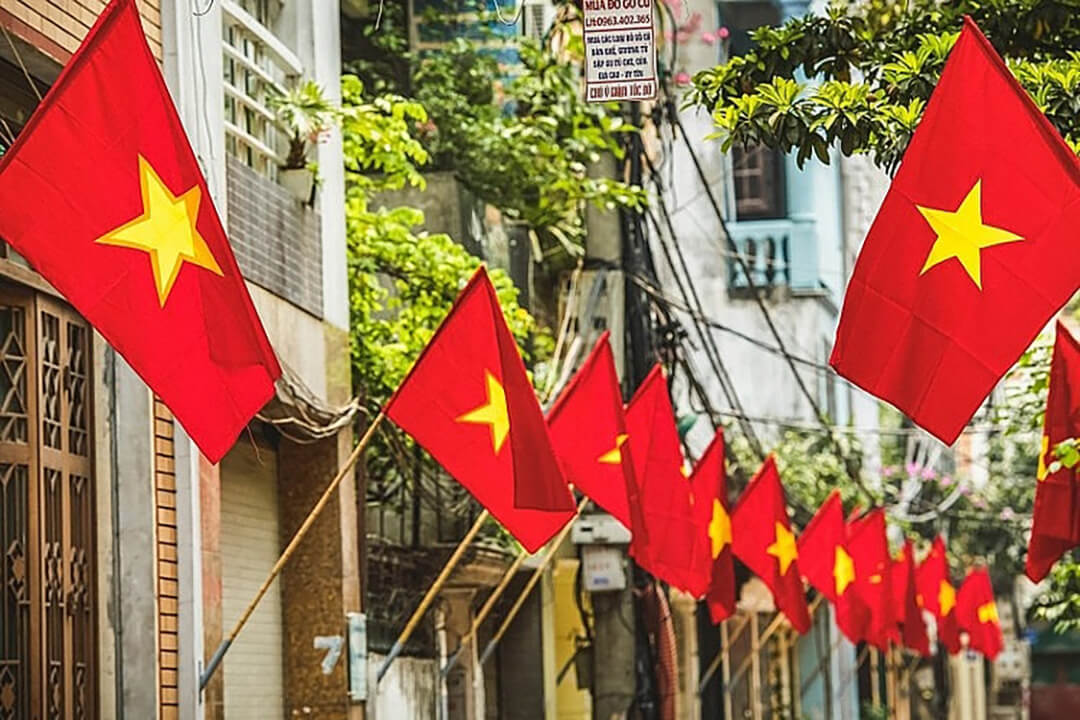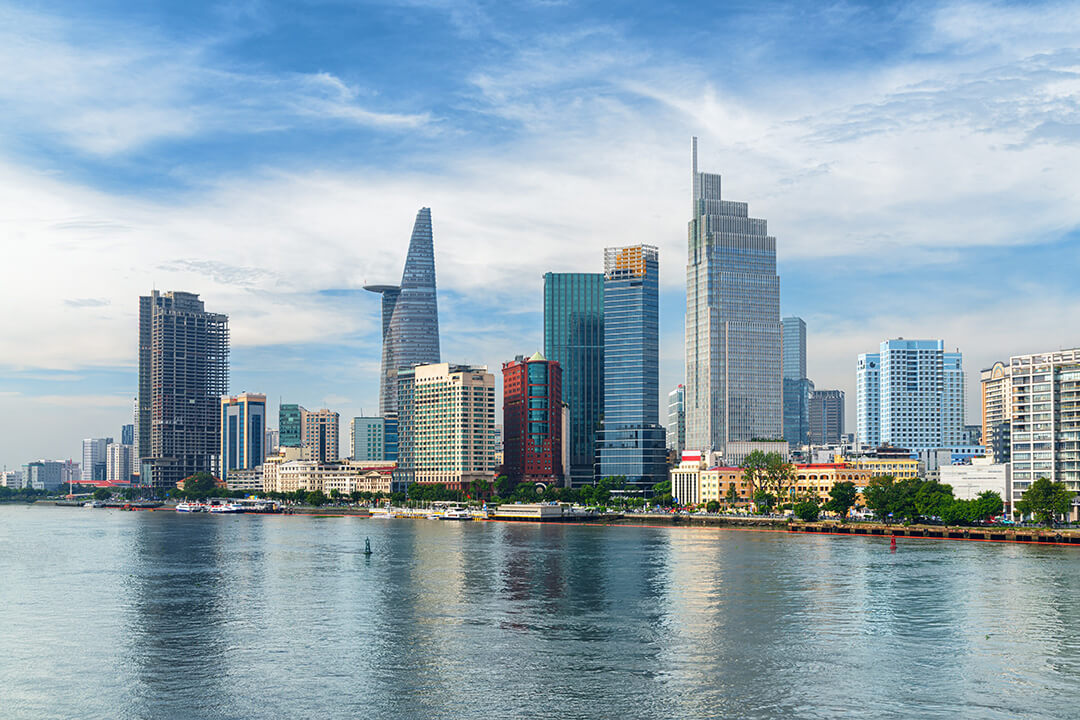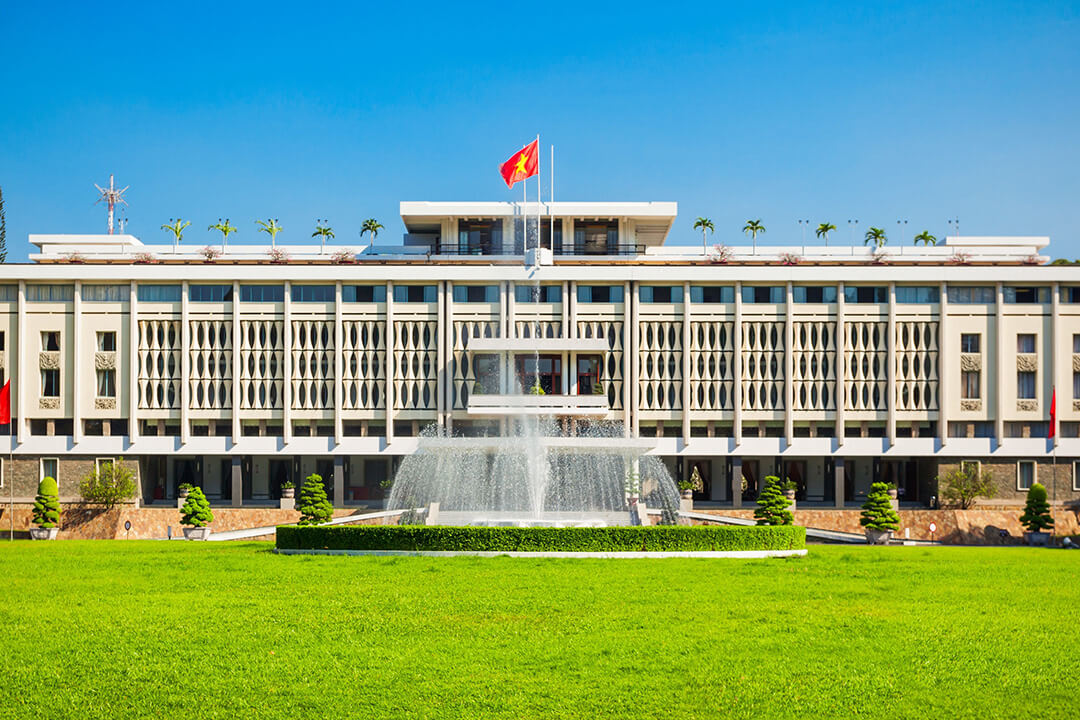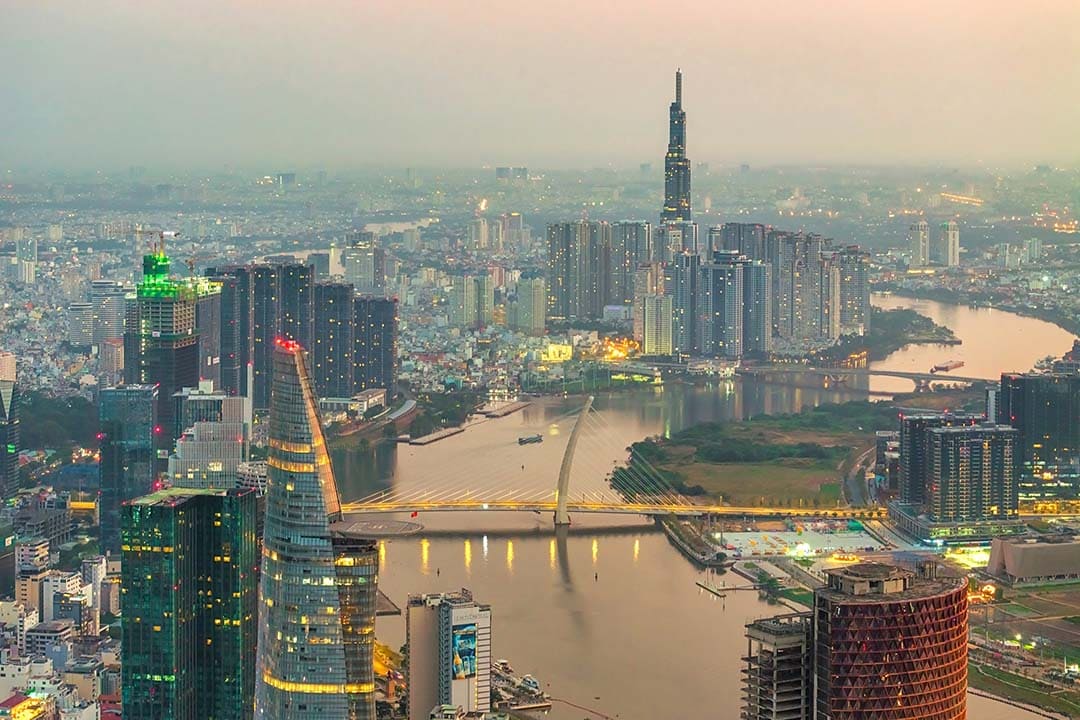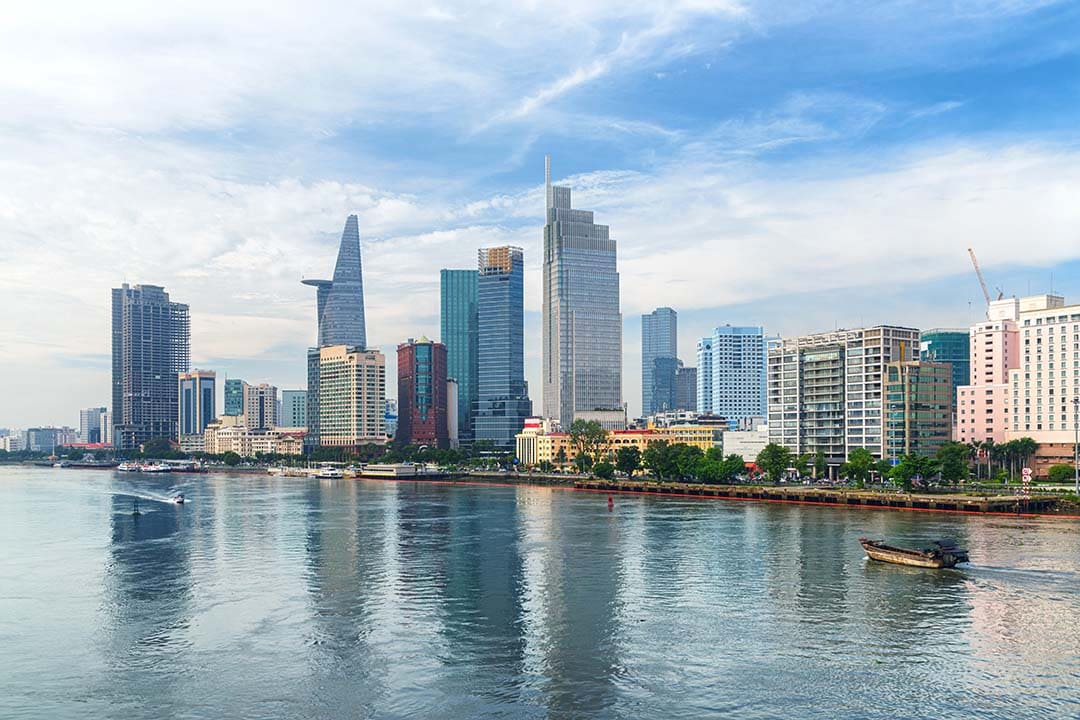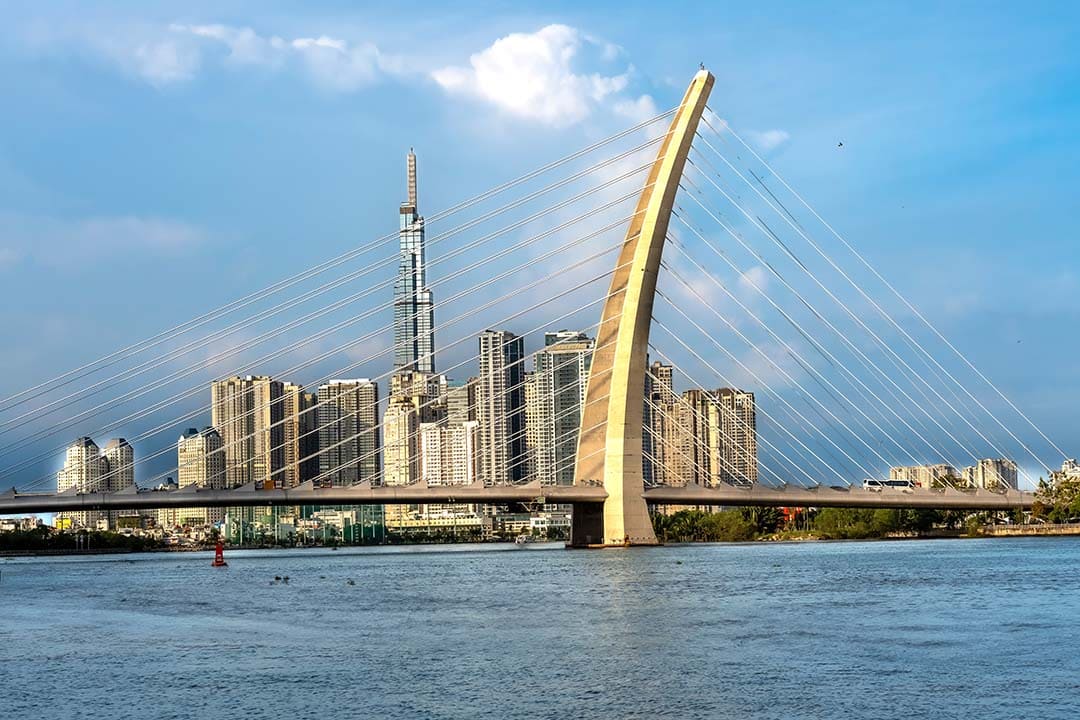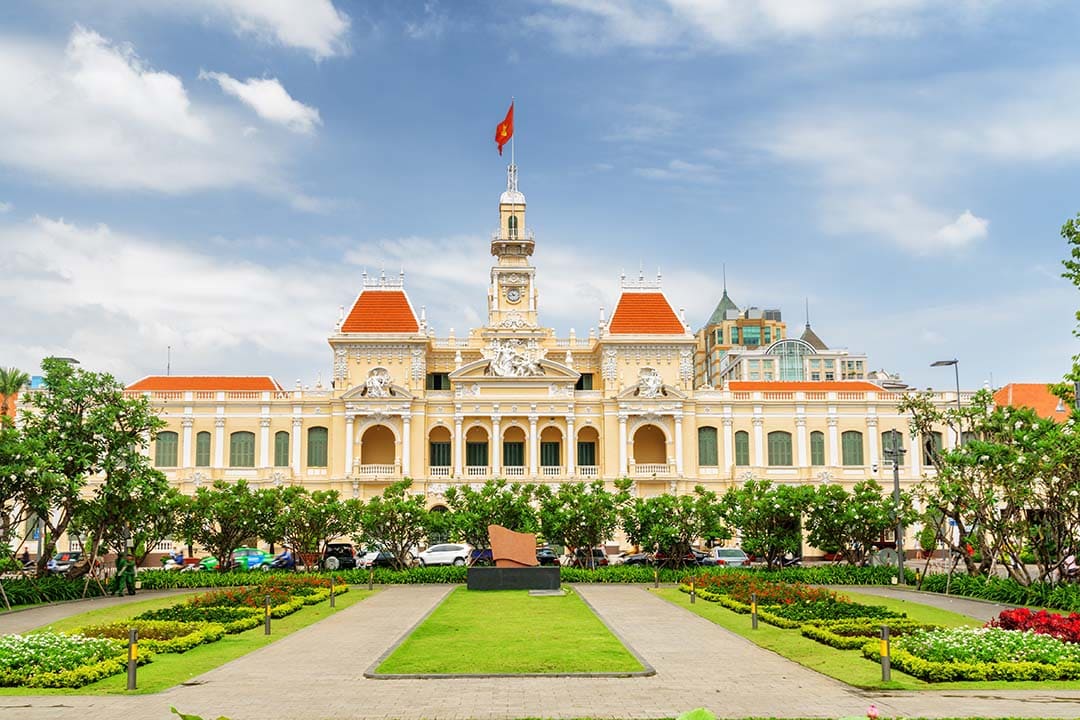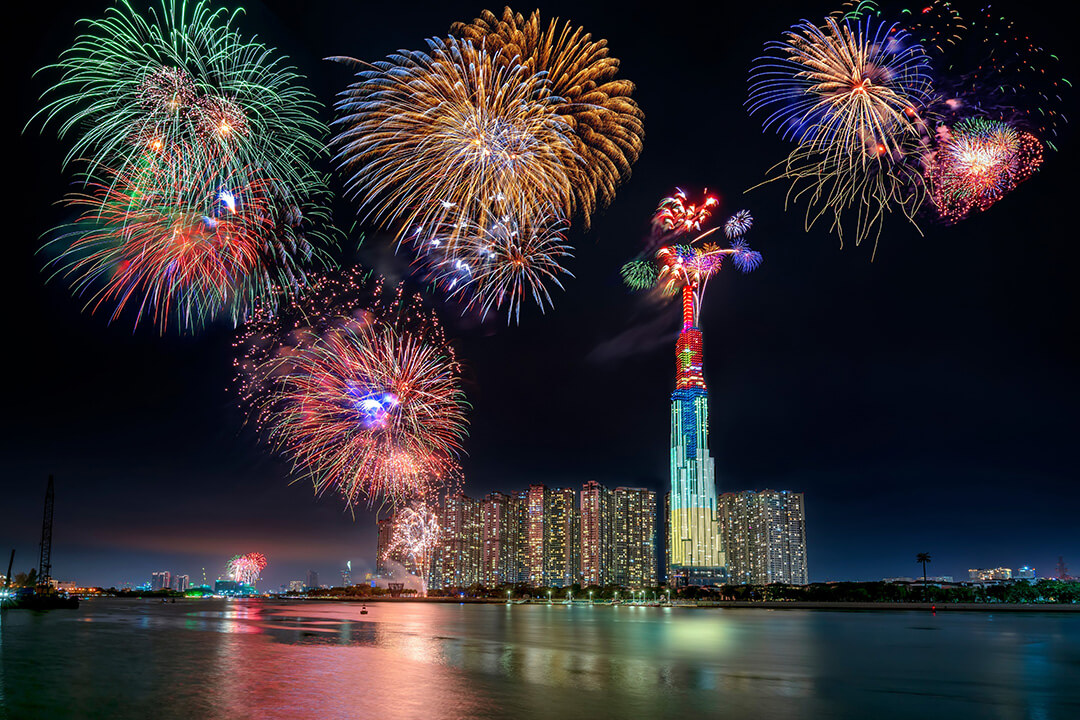Sep - 17 - 2025
Ninh Binh, a stunning province in Northern Vietnam, is characterized by its tropical monsoon climate, offering travelers a diverse range of weather conditions throughout the year. With 4 distinct seasons, Ninh Binh’s weather varies significantly, making it essential for visitors to understand what to expect during their travels.
From January to December, Ninh Binh features mild winters and hot summers, with significant rainfall during the monsoon season. Travelers often wonder: What do you wear in Ninh Binh, Vietnam? When should I go to Ninh Binh? What is the hottest month in Vietnam? What is the climate in Ninh Binh? In this guide, GTrip will answer these questions while providing a comprehensive overview of Ninh Binh’s weather.
Month | Min (°C) | Max (°C) | Mean (°C) | Min (°F) | Max (°F) | Mean (°F) |
January | 14.6 | 19.6 | 17.1 | 58 | 67 | 62.8 |
February | 15.4 | 19.8 | 17.6 | 60 | 68 | 63.7 |
March | 18.0 | 22.4 | 20.2 | 64 | 72 | 68.4 |
April | 21.5 | 26.7 | 24.1 | 71 | 80 | 75.4 |
May | 24.5 | 30.9 | 27.7 | 76 | 88 | 81.9 |
June | 26.1 | 32.5 | 29.3 | 79 | 90 | 84.7 |
July | 26.5 | 32.8 | 29.6 | 80 | 91 | 85.3 |
August | 26.0 | 31.8 | 28.9 | 79 | 89 | 84.0 |
September | 24.9 | 30.4 | 27.6 | 77 | 87 | 81.8 |
October | 22.5 | 28.1 | 25.3 | 73 | 83 | 77.5 |
November | 19.2 | 25.0 | 22.1 | 67 | 77 | 71.8 |
December | 15.9 | 21.7 | 18.8 | 61 | 71 | 65.8 |
Year | 21.3 | 26.8 | 24.0 | 70.3 | 80.3 | 75.0 |
Ninh Binh weather: For seasons
Ninh Binh presents weather conditions across its four seasons, each offering unique tourist experiences and seasonal characteristics that influence travel plans.
Weather in Ninh Binh in spring
Spring in Ninh Binh lasts from February to April. The weather during this season features mild temperatures, light rainfall, and a festive atmosphere. This season showcases blooming landscapes filled with vibrant flower blossoms and lush green scenery, making it ideal for outdoor activities and sightseeing. Visitors should explore beautiful destinations like Bai Dinh Pagoda, Hoa Lu Ancient Capital, and Thai Vi Temple during this time.
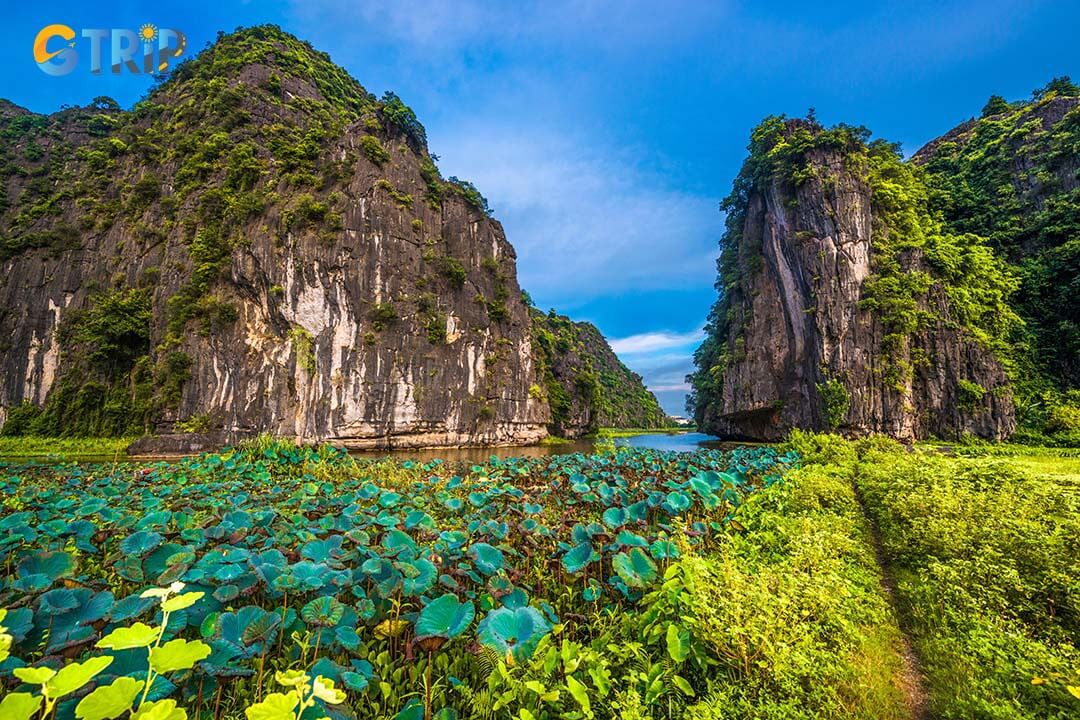
Ninh Binh's landscapes showcase a harmonious blend of towering limestone karsts, lush greenery, and tranquil waterways, offering a paradise for nature lovers
Q: What activities are recommended during spring in Ninh Binh?
A: The cool weather and beautiful scenery in spring in Ninh Binh create a stunning backdrop. With such weather and landscapes, it’s perfect for adventure and relaxation. Spring is ideal for outdoor activities in Ninh Binh, such as boating on the Ngo Dong River, climbing the 500 stone steps at Mua Cave, and exploring the blooming flowers at Tam Coc – Bich Dong.
Q: Are there cultural events or festivals to attend in spring?
A: Yes, the Bai Dinh Pagoda Festival in early spring attracts many visitors and offers a unique insight into local customs and traditions. On the first day of the lunar new year, many people come to Bai Dinh Pagoda. They visit the pagoda and pray for health and protection over the years. The festival will take place this evening and at the end of the third month. This vibrant event is a great opportunity to experience the cultural richness of Ninh Binh.
Q: What should I pack for a spring trip to Ninh Binh?
A: In this season, you should pack light layers, and rain protection is advisable, as spring can bring mild temperatures and occasional showers. Additionally, you should choose comfortable shoes for outdoor activities, which are also recommended.
Q: Is spring a good time for nature photography in Ninh Binh?
A: Absolutely! Spring in Ninh Binh, lush green landscapes and blooming flowers create breathtaking scenes perfect for photography. The colorful backdrops provide ample opportunities to capture the region’s natural beauty.
Q: Which flowers or plants are prominent in Ninh Binh during spring?
A: Lotus flowers begin to bloom, especially in late spring, adding a beautiful touch of color to Ninh Binh’s scenic areas. Other vibrant flowers also contribute to the region’s picturesque landscapes.
Q: How crowded are popular sites in spring?
A: Spring is the most popular season for tourists, especially around festivals, so expect moderate to high crowds at major attractions. Planning your visits early in the day can help you avoid peak times.

Vast lotus fields in Ninh Binh bloom in vibrant pink and green, creating a picturesque and fragrant setting that captivates visitors
Weather in Ninh Binh in summer
From May to July, summer in Ninh Binh offers hot and humid days characterized by high humidity levels and frequent rain showers influenced by the monsoon season. While the summer heat can be intense, it also brings lush green landscapes, making it a unique time to explore the region. Popular sites to visit during this period include Tam Coc, Dong Am Tien, Van Long Wetland Nature Reserve and Cuc Phuong National Park.
Q: How high are temperatures in summer?
A: Temperatures in the summer of Ninh Binh can reach up to 35°C (95°F), often feeling warmer due to the high humidity. The combination of heat and humidity can make outdoor activities more challenging.
Q: Are there activities to help beat the summer heat?
A: Yes, Many visitors can enjoy water-based activities like boat tours on Tam Coc’s rivers. These activities provide a refreshing way to cool down while enjoying the stunning scenery.
Q: Does summer rain impact travel in Ninh Binh?
A: Frequent rain showers are common during summer, but they are usually brief. It’s advisable to plan a mix of indoor and outdoor activities to accommodate the rainy weather.
Q: When are the best times to explore during summer?
A: Early morning and late afternoon are the coolest times of the day, making them ideal for sightseeing and hiking. These hours provide a more comfortable experience for outdoor exploration.
Q: Are there unique summer events in Ninh Binh?
A: While summer features fewer local festivals and cultural events than spring or autumn, some smaller festivals still showcase the region’s traditions and culture.
Q: Does summer weather make any areas inaccessible?
A: Heavy rains can make some trails slippery, affecting accessibility. Always check for any travel advisories when hiking, and consider alternative routes or activities if conditions are not favorable.
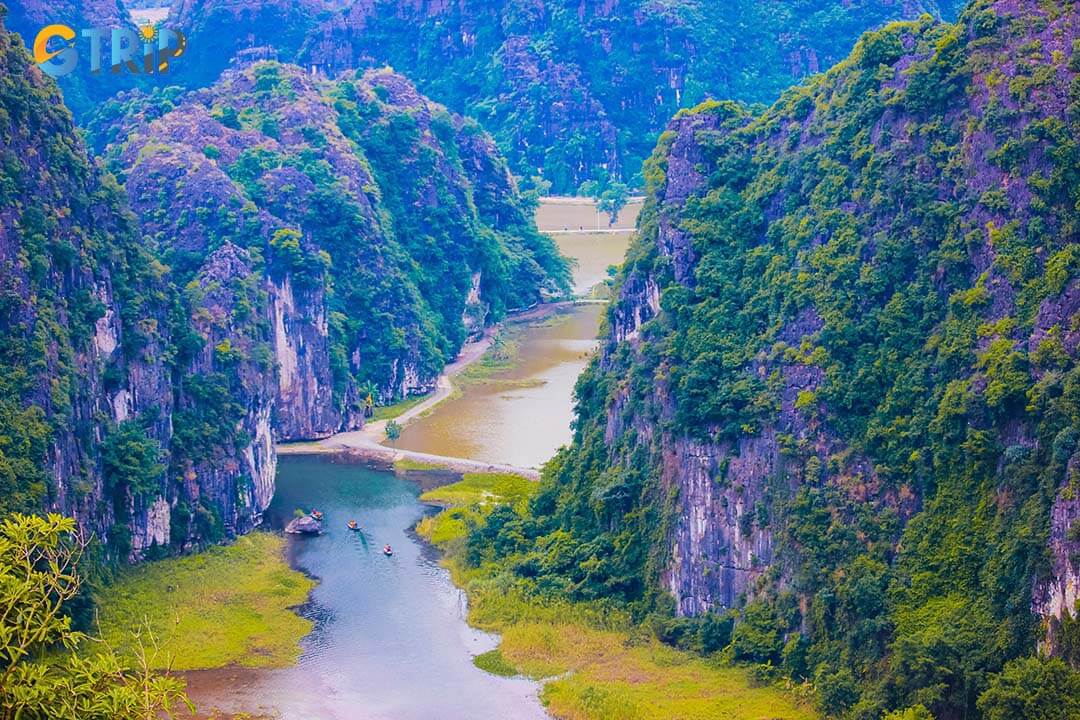
Ninh Binh is a region blessed with awe-inspiring natural beauty, from dramatic cliffs to serene rivers and verdant fields
Weather in Ninh Binh in autumn
From August to October, autumn in Ninh Binh brings cooler, pleasant weather, marking the start of dry days and showcasing beautiful scenic landscapes. The mild temperatures, lower humidity, and breathtaking autumn foliage make this an ideal time for exploring Ninh Binh’s natural beauty. During this period, destinations like Sao Ke River and Thung Nham Bird Park are especially recommended for their vibrant, seasonal charm.
Q: What’s the typical autumn weather like in Ninh Binh?
A: Autumn weather in Ninh Binh is mild and comfortable, with lower humidity and cooler temperatures. This season provides an enjoyable atmosphere for exploration and outdoor activities.
Q: What are some must-see scenic spots in autumn?
A: The rice fields around Tam Coc are particularly stunning in autumn as the harvest season peaks. These golden fields, combined with the surrounding limestone karsts, offer some of the most iconic views in the region.
Q: Is autumn suitable for hiking and outdoor activities?
A: Totally! With cooler temperatures, autumn is perfect for hiking, boat trips, and other outdoor adventures. The dry weather allows for comfortable trekking and exploration throughout the region’s parks and landscapes.
Q: Are crowds lighter in autumn compared to other seasons?
A: Yes, following the busy summer season, autumn generally sees lighter crowds, particularly in October and November. This makes it an ideal time to enjoy Ninh Binh’s attractions in a more relaxed and peaceful setting.
Q: What should I bring for an autumn trip?
A: A light jacket is recommended, as temperatures can be cool but pleasant, especially in the early morning and evening. Comfortable walking shoes are also ideal for the hikes and nature trails that autumn encourages.
Q: Are there seasonal food or drink specialties in autumn?
A: Yes, autumn is known for its unique harvest foods, such as sticky rice cakes and other traditional Vietnamese dishes that celebrate the season’s bounty. These specialties can be found at local markets and eateries throughout Ninh Binh.
You can discover more about Ninh Binh specialties combined with visiting attractions to enhance your travel experience here.
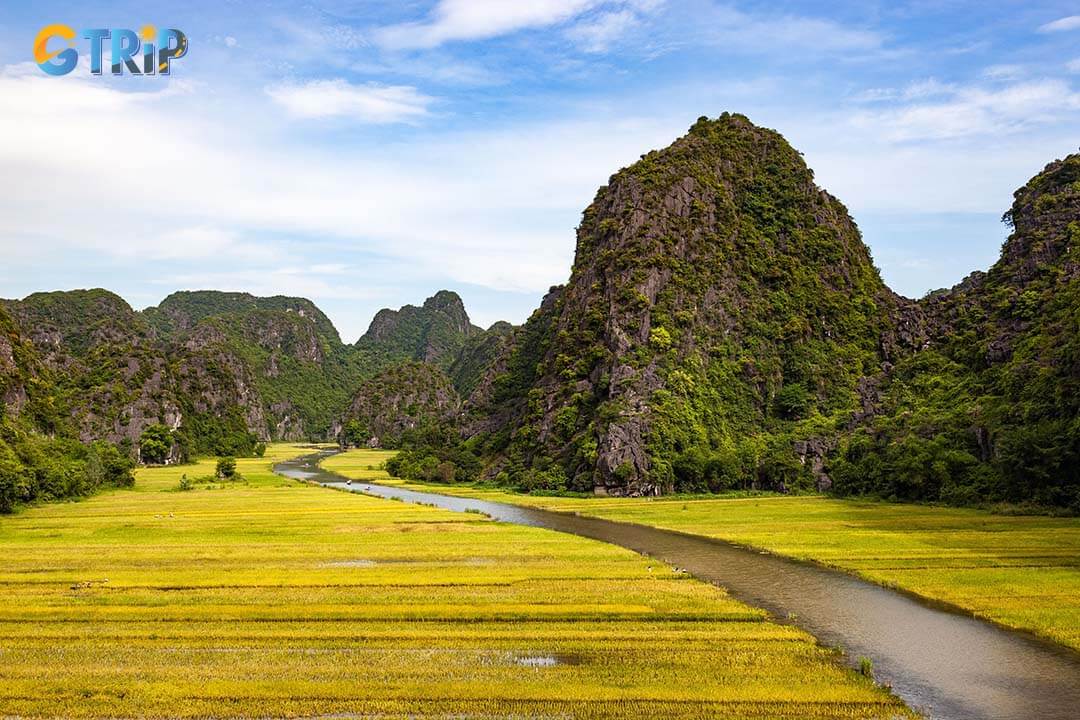
Golden and green rice fields stretch endlessly, painting a vivid rural charm across Ninh Binh’s countryside
Weather in Ninh Binh in winter
From November to January, winter in Ninh Binh features cool and dry conditions that create a serene, tranquil atmosphere. With cooler temperatures and clear, crisp air, this season is ideal for cultural exploration and offers a quieter experience of the region’s beauty. Winter’s charm is particularly notable at sites like Trang An Landscape Complex, Bai Dinh Pagoda, and Hoa Lu Cave, where the peaceful landscapes lend themselves to contemplation and discovery.
Q: How cold does it typically get in winter?
A: During winter, temperatures in Ninh Binh can drop to around 10°C (50°F), particularly in the early morning and evening. Travelers should pack warm clothing to ensure their comfort while exploring the beautiful landscapes and attractions of the region.
Q: What are the top indoor activities during winter?
A: Exploring the region’s historic and cultural sites is perfect for winter. Visiting Ninh Binh temples, learning about local heritage at places like Trang An Landscape Complex and Phat Diem Cathedral and touring the various pagodas offer enriching indoor options.
Q: Can I visit the temples and pagodas in winter?
A: Yes, temples such as Bai Dinh remain open year-round. Winter’s peaceful atmosphere makes it an ideal time for quiet reflection and exploring these spiritual sites.
Q: Are there any festivals or events in winter?
A: Winter concludes with the vibrant Lunar New Year celebrations, offering visitors a unique opportunity to experience local traditions and festivities. The late-winter period is marked by colorful cultural events special to the region.
Q: What makes winter a unique season to visit?
A: Winter’s cool, dry air and lighter crowds create a calm, reflective environment that enhances visits to historical and spiritual landmarks. The serene landscapes also lend a sense of intimacy to the experience of Ninh Binh’s natural beauty.
Q: Are clear skies common in winter for photography?
A: While winter mornings in Ninh Binh can be foggy, the mist often clears up by midday, creating ethereal and mystical scenery that’s perfect for photography. This adds a special atmosphere to winter images of the region.
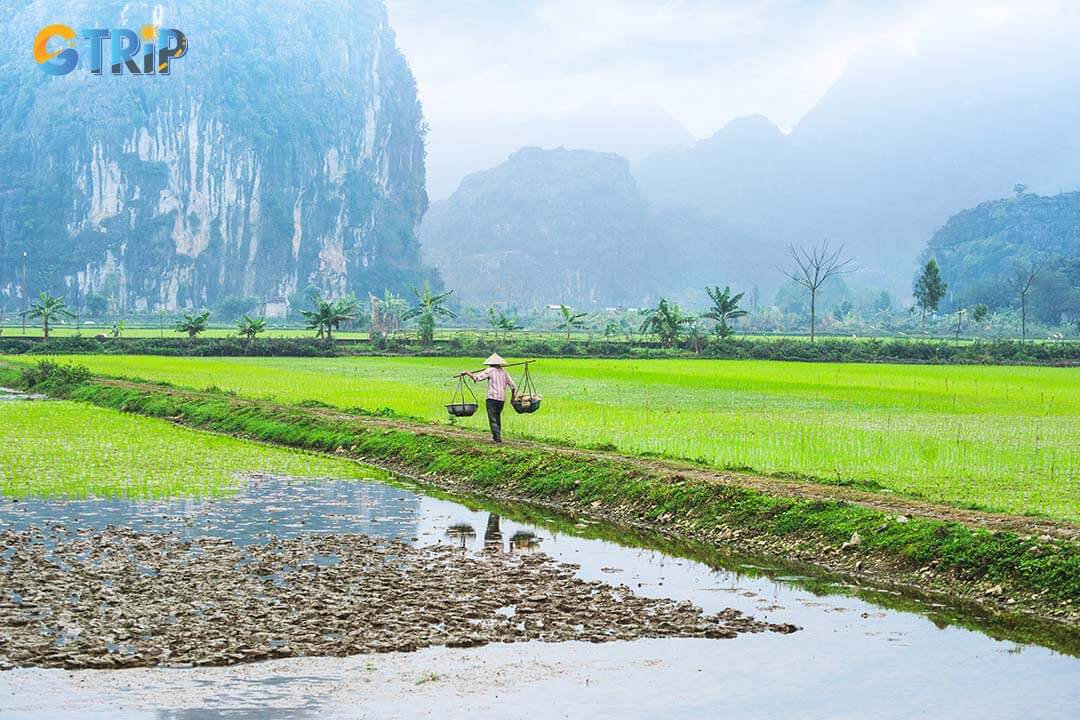
A farmer toils in the misty morning, bringing life to Ninh Binh’s serene and timeless rice fields
Ninh Binh Weather: For months
The weather in Ninh Binh changes monthly, influencing travel differently throughout the year. Below is a detailed look at monthly weather patterns, climate variations, and rainfall levels.
1. Ninh Binh weather in January
As the new year begins, the weather in Ninh Binh in January will be cool and refreshing, making it an ideal time for exploration. This month’s mild temperatures and dry conditions invite travelers to experience the region’s stunning landscapes and rich cultural heritage.
Mild and comfortable climate
The weather in Ninh Binh in January was around 17.9°C (64.22°F). Expect lows of 15.7°C (60.26°F) and highs of 20.4°C (68.72°F). Rainfall is minimal, with about 10.3 mm over roughly 1.8 rainy days, ensuring you can plan your outdoor adventures without worry. The weather is perfect for sightseeing, with a humidity level of 77.5% and about 5.7 hours of sunshine daily.
Smooth transition in temperatures
January marks a slight drop in temperatures compared to December’s highs of 21.8°C (71.24°F). As the month progresses, temperatures gradually increase into February, allowing you to enjoy a comfortable winter climate.
Experience local culture
January is also a vibrant time for cultural festivals. These celebrations offer a fantastic opportunity to connect with local traditions and experience Ninh Binh’s unique culture firsthand. The festive atmosphere enhances the region’s charm, making your visit even more memorable.
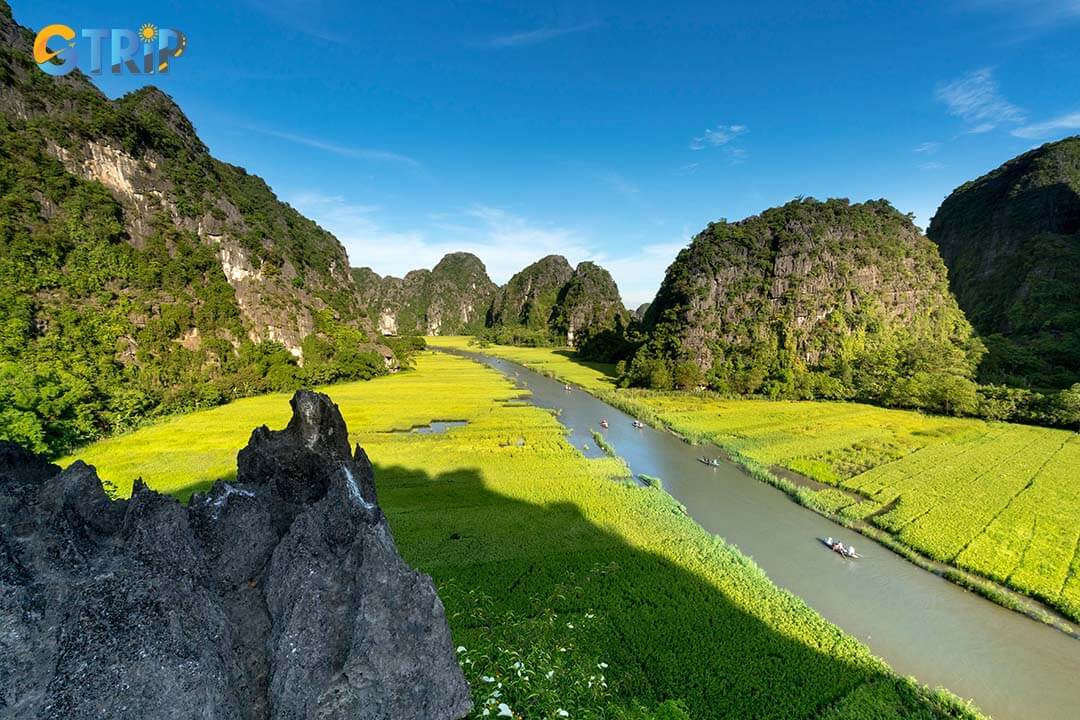
The Ngo Dong River meanders gracefully through the region, flanked by towering karsts and lush landscapes
2. Ninh Binh weather in February
As winter gradually gives way to spring, February brings a magical touch to Ninh Binh. The weather is mild, with light rains and misty mornings adding mystical charm to the region’s landscapes. With pleasant temperatures and the start of the festival season, February is an ideal month to experience Ninh Binh’s natural beauty and cultural vibrance.
Gentle weather and rising temperatures
Ninh Binh weather in February sits around 19.6°C (67.28°F), with lows of 17.2°C (62.96°F) and highs of 22.5°C (72.5°F). This slight increase from January signals a gradual warming, hinting at spring’s arrival. Rainfall remains light at 6.4 mm, spread over an average of 1.4 rainy days so that visitors can expect mostly dry weather with an average of 6.2 hours of sunshine each day.
Temperature shift overview
Temperatures see a steady rise as February progresses:
- January: High 20.4°C (68.72°F)/Low 15.7°C (60.26°F)
- February: High 22.5°C (72.5°F)/Low 17.2°C (62.96°F) – Slight increase, warming into spring
- March: High 25.4°C (77.72°F)/Low 19.7°C (67.46°F) – Temperatures continue to rise
The enchantment of morning fog and blooming landscapes
February in Ninh Binh is known for its morning fog, which gently blankets the landscapes and gives popular sites like the Trang An Complex a dreamlike quality. The blooming flora and misty mornings create stunning views and unique photo opportunities.
Experience the festival season
February also falls within Ninh Binh’s festival season, which is filled with cultural events and celebrations. Come to Bai Dinh Pagoda to enjoy the Bai Dinh Pagoda Festival or Hoa Lu Ancient Capital the festival will held on the 10th day of the first lunar month (usually in February). These festivities offer visitors a rare chance to engage with local traditions and enjoy the vibrant cultural heritage of the region.
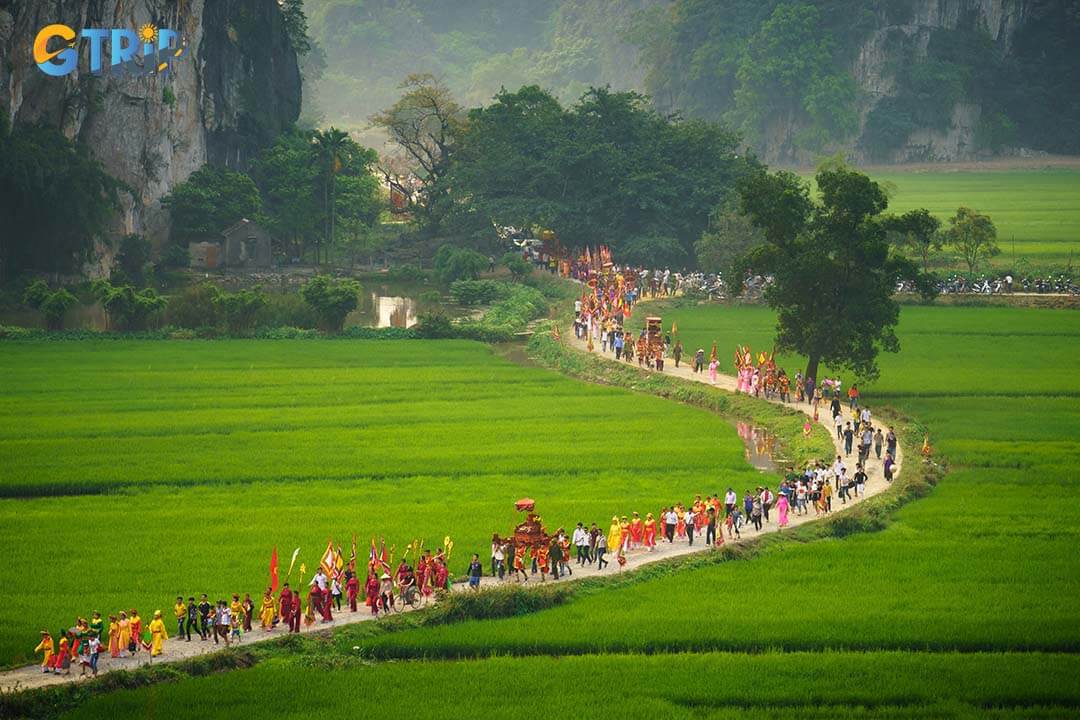
The procession of the gods of Dich Long Pagoda
3. Ninh Binh weather in March
The climate in Ninh Binh in March is warmer than in February, creating a vibrant spring atmosphere. With mild weather, blooming vegetation, and abundant sunshine, March is an ideal month to enjoy the stunning landscapes and vibrant culture of Ninh Binh.
Warm, comfortable weather
In March, the average temperature in Ninh Binh is a pleasant 22.1°C (71.78°F), with lows around 19.7°C (67.46°F) and highs reaching up to 25.4°C (77.72°F). Make for comfortable conditions perfect for hiking, boating, and sightseeing. Rainfall remains minimal at 9.1 mm across 1.7 rainy days, while humidity is relatively high at 79.7%, lending the scenery a lush, green appearance. With an average of 9 hours of sunshine daily, March provides ample light for outdoor activities.
Temperature progression into spring
As the season shifts from winter to spring, March sees a steady rise in temperatures:
- February: High 22.5°C (72.5°F) / Low 17.2°C (62.96°F)
- March: High 25.4°C (77.72°F) / Low 19.7°C (67.46°F) – A gradual warm-up
- April: High 29.3°C (84.74°F) / Low 22.0°C (71.6°F) – Temperatures climb as spring progresses
A spring atmosphere perfect for exploration
The Ninh Binh climate in March has mild temperatures and clear skies, making it ideal for outdoor adventures. Popular destinations such as Tam Coc and Mua Caves are especially appealing this month, as the growing flora and warmer days enhance the region’s natural beauty. The longer daylight hours and abundant sunshine make exploring Ninh Binh’s scenic landscapes easy.
4. Ninh Binh weather in April
The climate in April in Ninh Binh is a warm and inviting month, marking the end of spring with mild temperatures and more extended, sunnier days. This weather draws more visitors to the area, eager to experience Ninh Binh’s attractions in full bloom before summer.
Pleasantly warm weather
The temperature in Ninh Binh in April was around 25.2°C (77.36°F), with lows of 22.0°C (71.6°F) and highs reaching up to 29.3°C (84.74°F). Rainfall is still relatively low, with only 13.9 mm across an average of 3.5 rainy days, while humidity is slightly higher at 80.4%. With approximately 11.1 hours of sunshine daily, April offers plenty of daylight for exploration and photography, creating ideal tourist conditions.
Temperature shift into summer
Ninh Binh weather in April signals the transition from spring’s mildness to the warmer days of summer:
- March: High 25.4°C (77.72°F) / Low 19.7°C (67.46°F)
- April: High 29.3°C (84.74°F) / Low 22.0°C (71.6°F) – A noticeable increase
- May: High 33.4°C (92.12°F) / Low 25.6°C (78.08°F) – Temperatures continue to rise into early summer
Spring attractions and activities
April is a beautiful time to explore Ninh Binh’s natural and cultural attractions. Popular spots like Tam Coc – Bich Dong, and Bai Dinh Pagoda are wonderful this month, with vibrant greenery and blooming flowers framing the scenic landscapes. This period is also a great time for hiking and boat tours, as the weather is warm but not yet too hot for comfort.
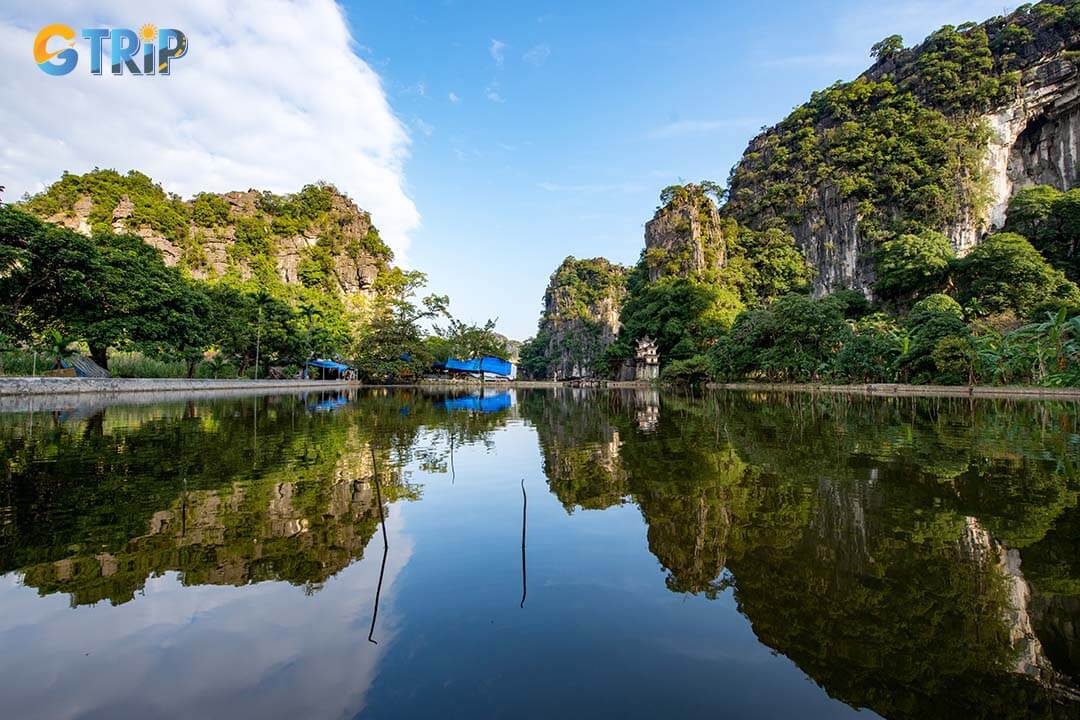
Cuc Phuong National Park, Vietnam’s oldest, is a haven of biodiversity and natural beauty, home to rare flora and fauna
5. Ninh Binh weather in May
May signals the beginning of summer in Ninh Binh, bringing warmer temperatures and the first touches of monsoon rains. This month sees a noticeable increase in humidity and rainfall, transforming the landscape into a lush, vibrant green.
Warmer days and high humidity
The average temperature in Ninh Binh during May is around 29.2°C (84.56°F), with lows of 25.6°C (78.08°F) and highs reaching up to 33.4°C (92.12°F). Early summer also brings higher humidity levels, although still manageable at 74.8%. Rainfall increases significantly to 32.6 mm across an average of 7.5 rainy days, accompanied by about 12.3 hours of sunshine daily. This blend of sun and rain encourages rapid growth of the region’s vegetation, making the landscape lush and vibrant.
Temperature trends leading into summer
The steady rise in temperatures in Ninh Binh from April to June marks May as a true transition month into summer:
- April: High 29.3°C (84.74°F) / Low 22.0°C (71.6°F)
- May: High 33.4°C (92.12°F) / Low 25.6°C (78.08°F) – Significant warming with summer’s onset
- June: High 35.1°C (95.18°F) / Low 27.7°C (81.86°F) – Further increases as summer peaks
Green landscapes and outdoor exploration
May’s combination of early monsoon rains and abundant sunshine makes for ideal conditions to appreciate Ninh Binh’s green landscapes. The region’s iconic sites, such as Trang An, are especially scenic, with verdant rice fields and forested mountainsides in full bloom. Warmer days, frequent showers, and high humidity enhance the area’s beauty, offering unique photo opportunities for visitors.
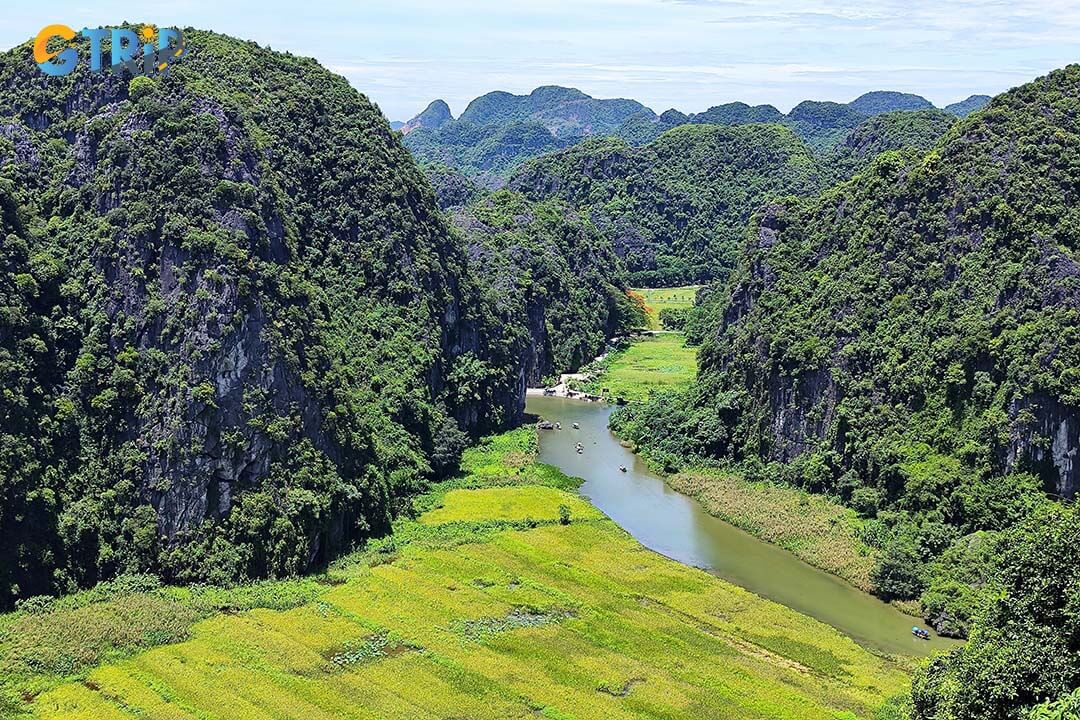
Known as "Ha Long Bay on Land" Tam Coc features a stunning mix of limestone peaks, winding rivers, and rice paddies
6. Ninh Binh weather in June
June is the peak month of the rainy season. The temperature in Ninh Binh in June increases to about 35°C, the humidity increases with continuous showers. This combination makes June one of the hottest and most humid months, yet it’s also a time when Ninh Binh’s landscapes reach a vibrant, lush beauty unique to the wet season.
Hot temperatures and high humidity
The average temperature in June is around 31.0°C (87.8°F), with highs peaking at 35.1°C (95.18°F) and lows at 27.7°C (81.86°F). Rainfall is steady, with 29.1 mm falling over an average of 7.5 rainy days. The humidity hovers around 69.5%, and June’s sunshine hours extend to 12.8 daily, adding to the warmth but providing ample light to enjoy the green landscapes.
Change the season from spring to monsoon heat
The temperature in Ninh Binh in June is the highest of the year, signaling the height of the monsoon and a full transition into summer:
- May: High 33.4°C (92.12°F) / Low 25.6°C (78.08°F)
- June: High 35.1°C (95.18°F) / Low 27.7°C (81.86°F) – Peak summer heat
- July: High 33.7°C (92.66°F) / Low 27.3°C (81.14°F) – Temperatures slightly decrease in July
Green and vibrant scenery in the monsoon season
Despite the hot and humid conditions, June is a stunning time to witness Ninh Binh’s landscapes at their greenest. The monsoon rains transform the region, with the mountains, rice fields, and rivers looking vibrant and lush. June provides stunning photo opportunities for those who don’t mind occasional rain. Popular sites like Tam Coc – Bich Dong and Trang An are beautifully framed by fresh greenery.
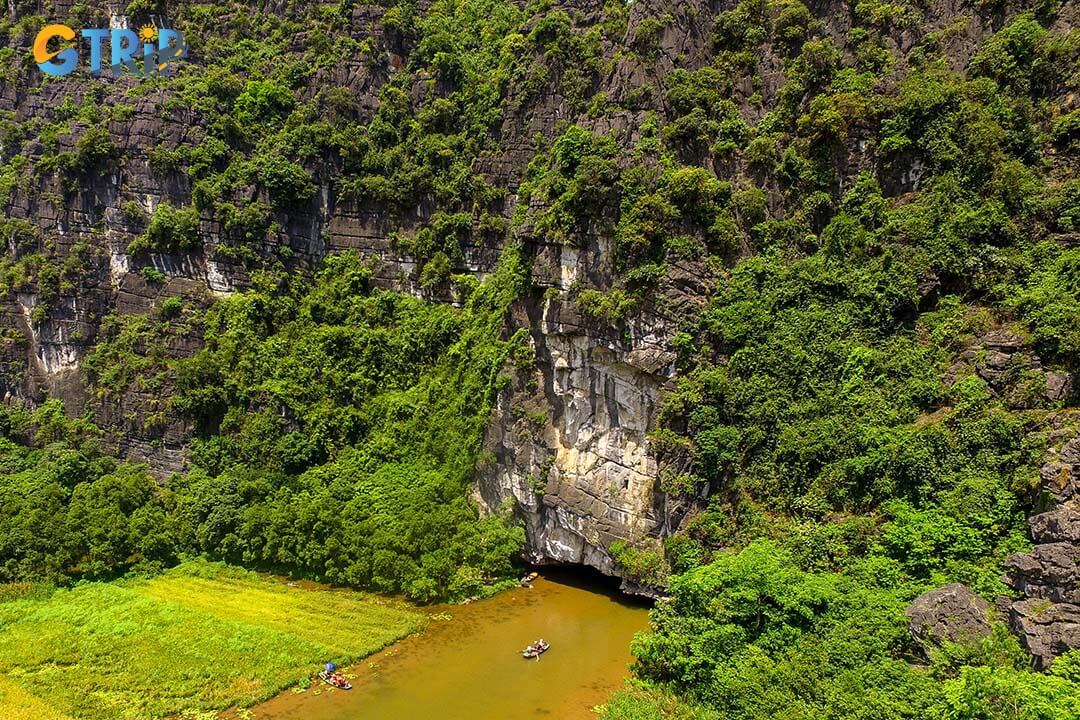
A bird’s-eye view of Tam Coc reveals its intricate waterways, rice fields, and limestone formations in all their splendor
7. Ninh Binh weather in July
The weather in Ninh Binh in July is characterized by hot and rainy conditions. The region experiences peak rainfall during the monsoon season. When you visit Ninh Binh this month, you should be prepared for wet weather while enjoying the unique beauty that the rain brings to the landscape.
Warm temperatures and high humidity
The average temperature in July hovers around 30.3°C (86.54°F), with highs reaching 33.7°C (92.66°F) and lows dropping to 27.3°C (81.14°F). Rainfall increases to an average of 39.9 mm over approximately 10.4 rainy days, making it one of the year’s wettest months. With humidity levels at 74.3%, the weather can feel particularly sticky, though July still enjoys around 12.6 hours of sunshine daily.
Transitioning weather patterns
As July progresses, the weather remains warm, yet there is a slight decrease in high temperatures compared to June:
- June: High 35.1°C (95.18°F) / Low 27.7°C (81.86°F)
- July: High 33.7°C (92.66°F) / Low 27.3°C (81.14°F) – Slightly cooler but still hot
- August: High 32.2°C (89.96°F) / Low 26.2°C (79.16°F) – Continued warmth with a gradual decline
Peak rainfall and lush landscapes
July marks the height of the monsoon season, bringing heavy rainfall that nourishes the region’s landscapes. The combination of warm temperatures and consistent rain results in vibrant green scenery, making it a picturesque time to explore Ninh Binh’s natural beauty. Popular destinations like Tam Coc and Trang An are particularly stunning during this month, with lush fields and waterways enhanced by the rain.
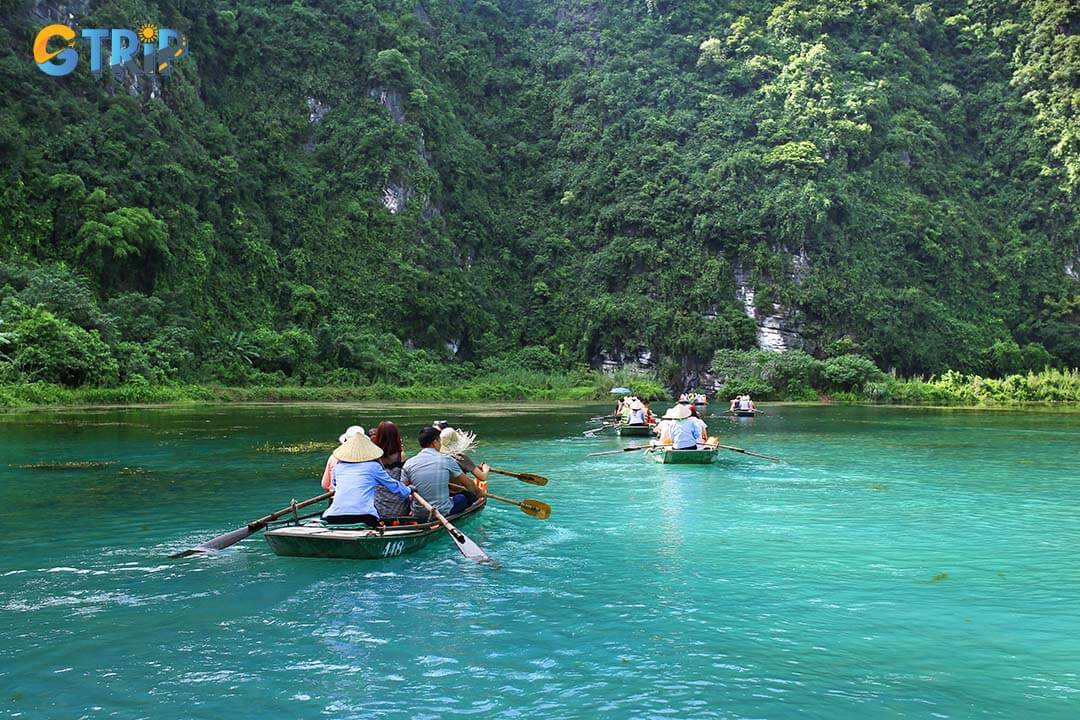
Visitors explore the Trang An Scenic Complex by boat, drifting through mystical caves and breathtaking waterways
8. Ninh Binh weather in August
The weather in Ninh Binh in August marks the transition period as the late monsoon season begins to wind down. This month continues to experience high humidity, with occasional storms making it a unique time to visit the region.
Warm temperatures and humidity
This month the temperature in Ninh Binh was around 29.0°C (84.2°F), with highs reaching up to 32.2°C (89.96°F) and lows dipping to 26.2°C (79.16°F). The region sees an increase in rainfall, averaging 69.6 mm over approximately 11.1 rainy days. Humidity remains elevated at 79.6%, contributing to the warm and muggy conditions, although there are still about 12.1 hours of sunshine each day.
Weather patterns from July to August
As the monsoon season progresses, temperatures slightly decrease:
- July: High 33.7°C (92.66°F) / Low 27.3°C (81.14°F)
- August: High 32.2°C (89.96°F) / Low 26.2°C (79.16°F) – A gradual decline
- September: High 31.4°C (88.52°F) / Low 25.2°C (77.36°F) – Continuing the trend of cooler weather
Storm preparation and late monsoon conditions
Its late monsoon effects characterise August, where visitors may experience occasional storms. While these storms can bring heavy rain, they also provide a much-needed respite from the heat. Travelers should be prepared for sudden downpours and check local forecasts before venturing out. Despite the storms, the lush landscapes and vibrant scenery remain a highlight of this time of year.
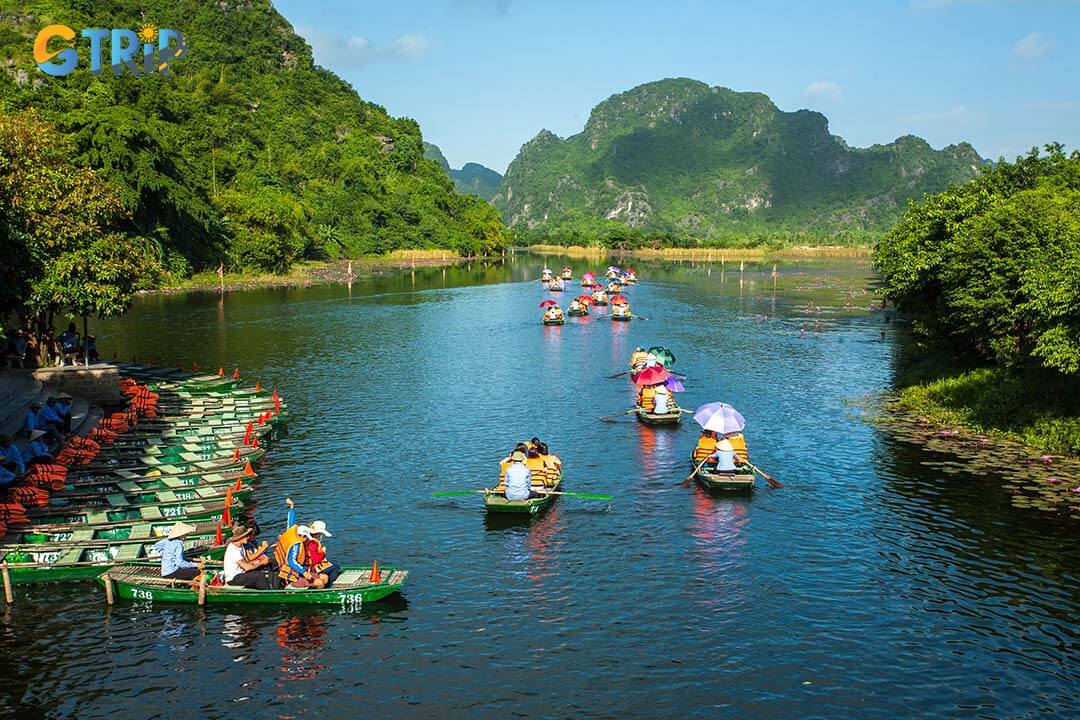
Trang An is world-famous for its boat cave tours, offering a unique journey through nature and history
9. Ninh Binh weather in September
September in Ninh Binh signals the end of autumn with cooler temperatures and a noticeable reduction in rainfall. This transition from the monsoon season to drier days makes September an appealing time for visitors to explore the scenic region.
Milder temperatures and lower rainfall
The average temperature in Ninh Binh in September hovers around 28.0°C (82.4°F). Daytime highs reach up to 31.4°C (88.52°F), while lows are around 25.2°C (77.36°F), offering a more comfortable range compared to previous summer months. Rainfall is lower than in August, with an average of 50.4 mm over approximately 9.5 rainy days. Humidity, however, remains relatively high at 79.5%, while there are around 11.1 hours of sunshine each day.
Weather trends from August to September
As autumn begins, the temperatures gradually decrease:
- August: High 32.2°C (89.96°F) / Low 26.2°C (79.16°F)
- September: High 31.4°C (88.52°F) / Low 25.2°C (77.36°F) — A slight drop
- October: High 28.8°C (83.84°F) / Low 22.6°C (72.68°F) — Cooler and drier
Ideal weather for outdoor activities
The climate in Ninh Binh in September is milder and reduced rainfall creates comfortable conditions for outdoor exploration. This month is ideal for:
- Boat tours in Tam Coc and Trang An: The drier weather enhances boat tours through scenic rivers and limestone cliffs. Visitors can take in uninterrupted views of the lush landscape and calm waters.
- Hiking and biking: Cooler temperatures make hiking up to Mua Caves or biking around the countryside more enjoyable. These activities provide both adventure and scenic views of the surrounding nature.
- Visiting bird parks: Thung Nham Bird Park is especially vibrant, with migratory birds arriving as the season shifts. This is a perfect time for birdwatching and immersing in the area’s rich biodiversity.
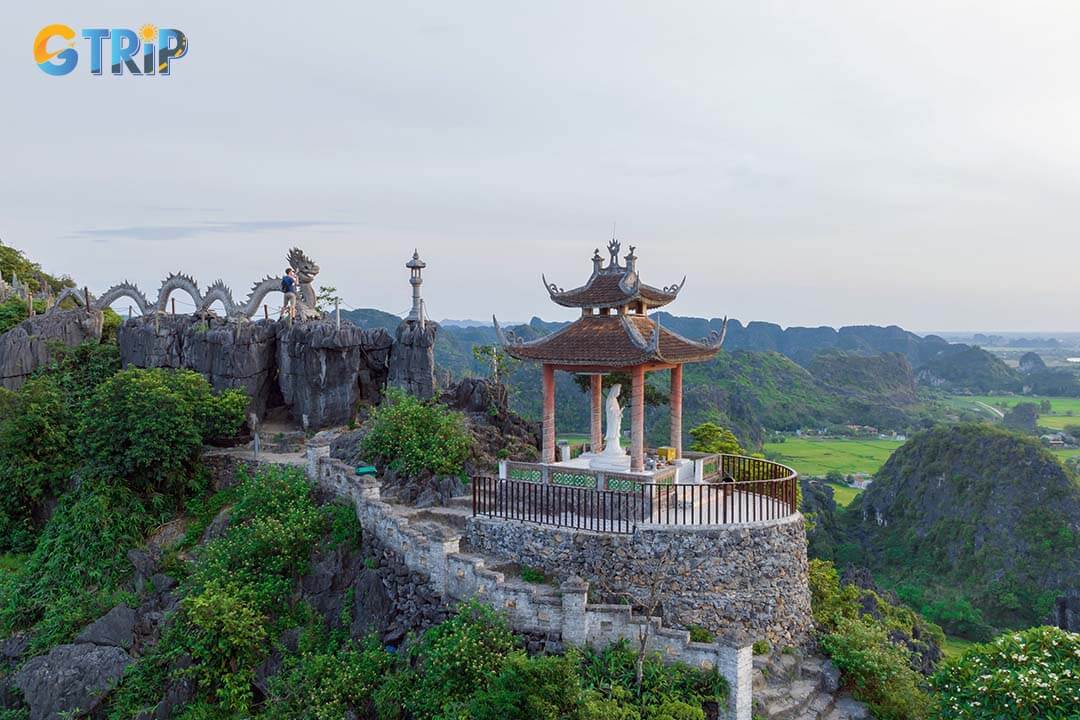
The Mua Cave Mountain viewpoint rewards climbers with sweeping views of Tam Coc’s majestic landscapes
10. Ninh Binh weather in October
October in Ninh Binh starts the dry season, but the weather is still mild and pleasant. Temperatures at this time are quite cool, with low humidity and less rain than in previous months.
Ideal temperatures for outdoor activities
In October, Ninh Binh’s average temperature is around 25.5°C (77.9°F), with daytime highs reaching 28.8°C (83.84°F) and lows dipping to 22.6°C (72.68°F). These mild temperatures are a refreshing change from the hot summer months, creating pleasant conditions for sightseeing and outdoor adventures.
Decreasing rainfall and lower humidity
As October falls into the dry season, rainfall reduces to about 41.1 mm over an average of 6.9 days. The humidity level also drops to 75.3%, along with 9.7 hours of sunshine, making the weather comfortable and appealing for day trips and exploration.
Weather shift from September to October
Temperatures continue to cool as autumn progresses:
- September: High 31.4°C (88.52°F) / Low 25.2°C (77.36°F)
- October: High 28.8°C (83.84°F) / Low 22.6°C (72.68°F) – Slightly cooler
- November: High 26.3°C (79.34°F) / Low 20.6°C (69.08°F) – Marked by even cooler temperatures
The perfect month for outdoor exploration
October’s pleasant weather is ideal for:
- Sightseeing at the Trang An Landscape Complex: With drier days, boat tours offer uninterrupted views of lush limestone formations and clear blue skies. Visitors can fully appreciate the stunning natural beauty and serene ambiance of the area.
- Hiking at Mua Caves: Cooler temperatures make the trek up to Mua Caves a comfortable experience, offering panoramic views of the harvest season below. The breathtaking scenery makes the climb well worth the effort.
- Exploring local temples and pagodas: The Bai Dinh Pagoda and Hoa Lu Ancient Capital are especially peaceful with fewer rainy interruptions. These historic sites provide a quiet retreat, allowing for a deeper connection to the region’s cultural heritage.
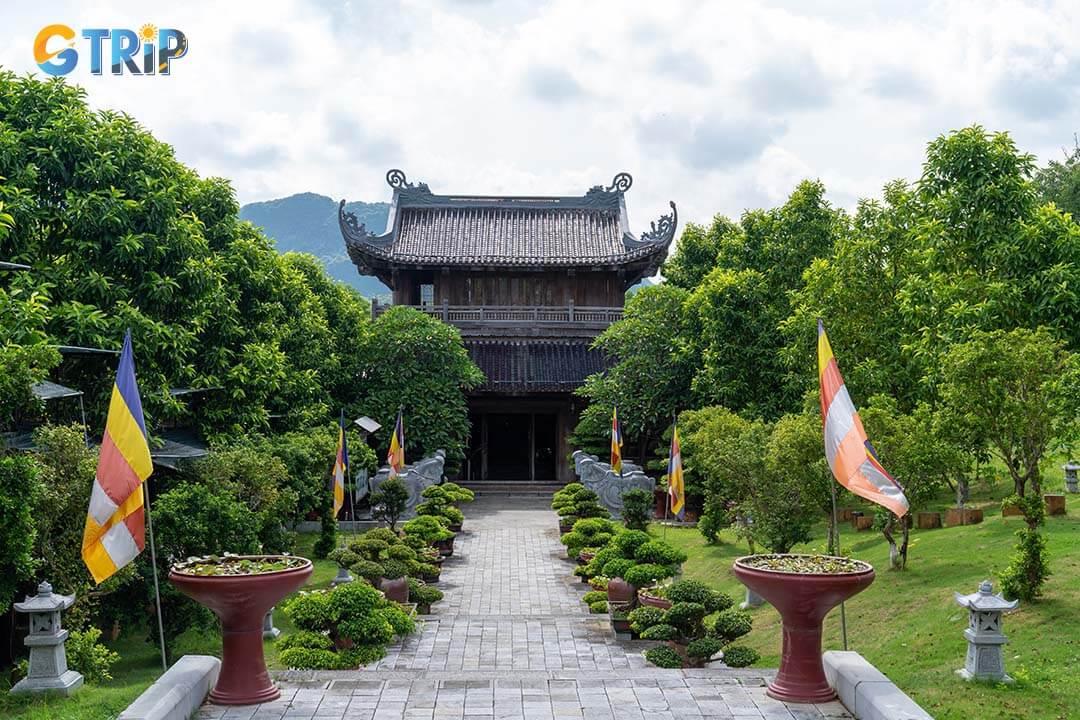
Bai Dinh Pagoda impresses with its vast complex, serene courtyards, and stunning views of the surrounding scenery
11. Ninh Binh weather in November
November in Ninh Binh offers pleasant and cooler weather as winter draws to a close, setting the stage for an ideal time to explore both the natural and cultural attractions.
Mild and comfortable temperatures
November sees average temperatures around 23.3°C (73.94°F), with highs of 26.3°C (79.34°F) during the day and lows dipping to 20.6°C (69.08°F) in the evening. The cooler, yet comfortable, conditions allow visitors to enjoy outdoor activities and sightseeing without the heat of the earlier months.
Reduced rainfall and manageable humidity
Rainfall drops significantly to just 12.1 mm over an average of 3 rainy days, and humidity levels ease to around 74.4%. With 7.1 hours of sunshine daily, November has a balanced mix of warm sunlight and cool breezes, ideal for outdoor exploration.
Month-by-month temperature trends
The temperature continues to fall gradually, transitioning into the winter season:
- October: High 28.8°C (83.84°F) / Low 22.6°C (72.68°F)
- November: High 26.3°C (79.34°F) / Low 20.6°C (69.08°F) – Notably cooler
- December: High 21.8°C (71.24°F) / Low 16.4°C (61.52°F) – Significantly cooler as winter approaches
Activities in November
- Enjoy Ninh Binh’s local food: When visiting Ninh Binh, be sure to try local delicacies like goat meat, snail mountain, and scorched rice, which highlight the region’s culinary heritage. Each dish offers a unique flavor and reflects the area’s agricultural traditions, making them essential for food enthusiasts.
- Exploring nature reserves: Cuc Phuong National Park is particularly stunning in late autumn, making it a paradise for nature lovers and hikers. The park’s trails wind through lush greenery, offering chances to spot diverse wildlife and enjoy the beauty of the natural landscape.
- Enjoying local cultural events: As winter approaches, local events and festivals glimpse traditional Vietnamese culture. These celebrations feature music, dance, and artisan markets, creating a vibrant atmosphere for visitors to connect with the local community.
12. Ninh Binh weather in December
December marks the end of winter in Ninh Binh, bringing cooler, dry air that makes it an ideal time for winter travelers. As temperatures drop and rain lessens, the weather offers crisp conditions, perfect for exploring the region’s scenic landscapes and cultural sites.
Cool and comfortable temperatures
December experiences an average temperature of around 18.9°C (66.02°F), with daytime highs reaching up to 21.8°C (71.24°F) and evening lows dropping to 16.4°C (61.52°F). These milder temperatures create a refreshing atmosphere, allowing for comfortable exploration without the heat and humidity of summer months.
Dry conditions and lower humidity
With only 3.4 mm of rain across less than one day, December is one of the driest months of the year. Humidity sits at a comfortable 70.2%, adding to the crisp, refreshing feel of the season. Clear skies also allow for about 6.4 hours of sunshine each day, illuminating the scenic beauty of Ninh Binh during winter.
Temperature trends in late autumn to early winter
Ninh Binh sees a steady cooling trend as it transitions from November to December:
- November: High 26.3°C (79.34°F) / Low 20.6°C (69.08°F)
- December: High 21.8°C (71.24°F) / Low 16.4°C (61.52°F) – noticeable drop in warmth
- January: High 20.4°C (68.72°F) / Low 15.7°C (60.26°F) – slight further cooling as winter progresses
Activities and attractions in December
The cool, dry weather in December provides optimal conditions for:
- Exploring temples and pagodas: The tranquil atmosphere and fewer crowds make it an ideal time to visit spiritual sites like Bai Dinh Pagoda and Phat Diem Cathedral.
- Nature walks and outdoor adventures: Locations such as Van Long Nature Reserve and Trang An Scenic Landscape Complex offer picturesque winter scenery with misty mornings and clear skies.
- Cultural celebrations: As the Lunar New Year approaches, local preparations create a festive atmosphere, and you may even catch early celebrations and cultural performances.
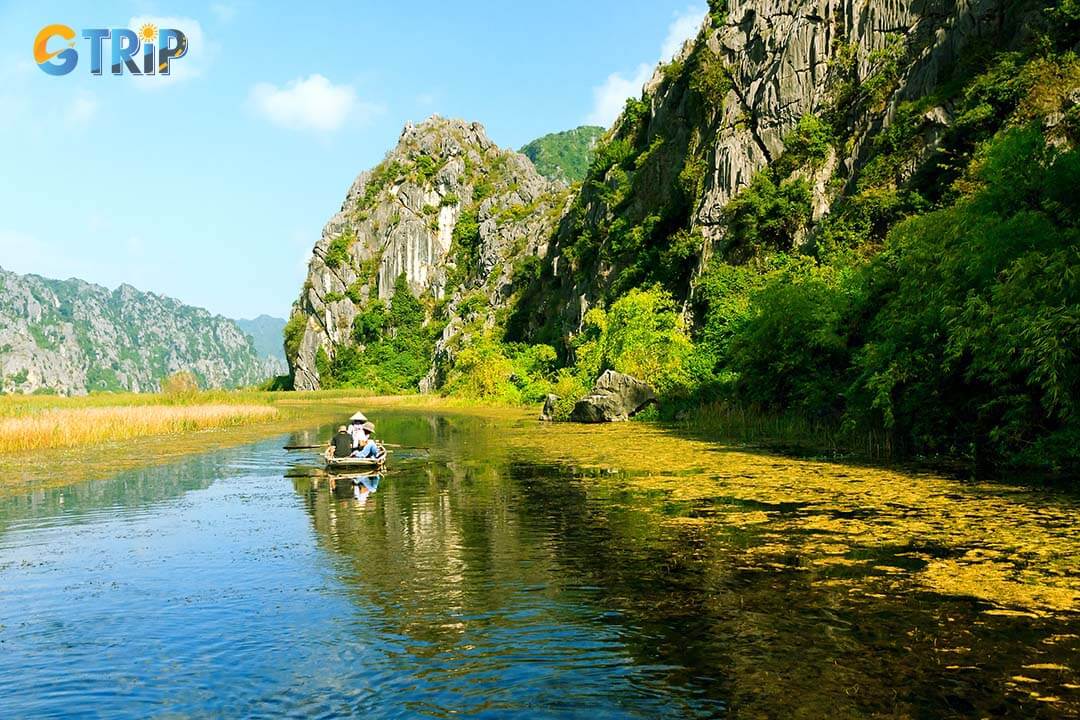
The Van Long Wetland Reserve offers tranquil boat rides, surrounded by lush greenery and limestone cliffs
Tips when visiting Ninh Binh
Planning a trip to Ninh Binh? These tips will help you prepare for each season, from packing essentials to seasonal activities, for a comfortable and enjoyable experience exploring Ninh Binh’s beauty.
Spring (February – April)
Spring in Ninh Binh is a delightful season, with mild weather, blooming flowers, and vibrant festivals. It’s the perfect time for outdoor adventures, offering picturesque views and a welcoming atmosphere for exploration.
- Packing tips: Light, comfortable clothing is best, but pack a light jacket or scarf for the cooler mornings and evenings. Since spring in Ninh Binh can bring occasional drizzle, bringing a compact umbrella or raincoat is a good idea to stay dry without disrupting plans.
- Travel advice: Start sightseeing early in the morning, especially at popular spots like Tam Coc and Bai Dinh Pagoda, to make the most of your trip. Early visits offer quieter experiences and capture the morning light, which is ideal for photography and serene views before the crowds arrive.
Summer (May-August)
Ninh Binh’s summer is warm and humid, with frequent rain showers in the afternoons. The landscapes are lush and vibrant, making this a great season for eco-friendly excursions like boat trips or nature hikes.
- Packing tips: Wear light, breathable clothing, and bring sunscreen, a hat, and a reusable water bottle. A rain jacket or umbrella is handy for unexpected showers.
- Travel advice: Try to explore in the early morning or late afternoon to avoid the intense midday heat. Checking the weather forecast daily is also a good idea to stay prepared for any rainstorms.

Tourists glide along calm rivers, marveling at the unspoiled beauty of Ninh Binh’s natural wonders
Autumn (September – November)
Autumn in Ninh Binh offers cool, mild temperatures, perfect for exploring the outdoors and capturing the stunning fall landscape. The season’s golden rice fields and scenic views make this an ideal time for photography. Many travelers find autumn to be one of the most charming seasons in Ninh Binh.
- Packing tips: Dress in light layers to stay comfortable as temperatures shift, and bring a camera to capture the beautiful fall foliage. A small, portable tripod can help capture steady shots of scenic vistas.
- Travel advice: Plan a visit to Tam Coc during the rice harvest season for breathtaking views of golden fields against limestone peaks. Early mornings provide soft lighting and peaceful surroundings for exploration.
Winter (December – January)
Winter in Ninh Binh is characterized by crisp, cool temperatures and a peaceful, serene atmosphere, making it ideal for quiet exploration and cultural visits. The cold air adds a unique charm to historical and religious sites, enhancing the sense of tranquility during this season.
- Packing tips: Bring warm clothing, as temperatures can drop, especially in the mornings and evenings. A scarf or hat can add extra comfort against the chill.
- Travel advice: Foggy days are best avoided if you’re looking for clear views, but the mist can add a mystical touch to the landscape if you’re up for an atmospheric experience. Winter festivals and temple visits offer rich insights into local culture and spirituality.

Tourists float by boat on the river

